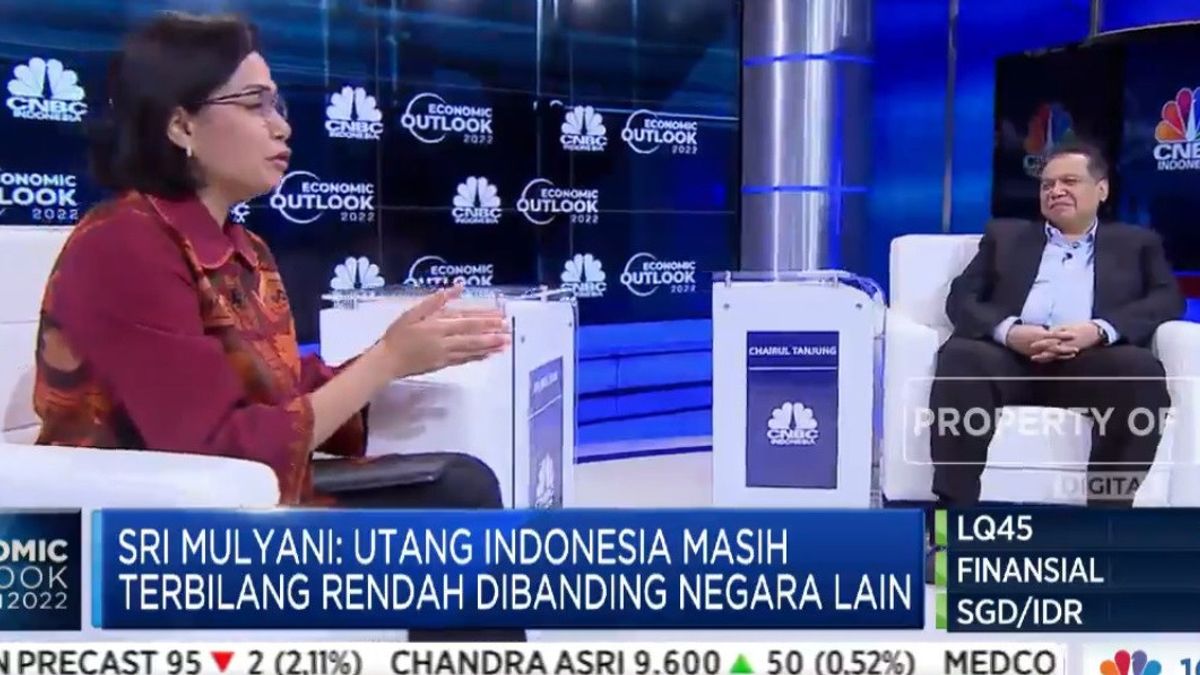JAKARTA – Minister of Finance (Menkeu) Sri Mulyani gave a response to the question of entrepreneur Chairul Tanjung (CT) in a discussion on state finances. On this occasion, the Minister of Finance explained that the increase in the debt ratio this time could not be separated from the role of the state in protecting the people.
It was revealed that the pandemic conditions forced the government to take quick action even though it had implications for the burden of the state budget. On the other hand, it is certain that state revenues will decline due to the cessation of the economic sector.
"First, the state money (APBN) is used in accordance with the purpose of the law. Well, this instrument experienced a big shock with a drop in revenue of 18 percent because the business world stopped. Meanwhile, we are faced with the effects of the pandemic, such as health threats, layoffs, social threats, and the financial sector could collapse and become a crisis if not handled," he said through the CNBC channel, Tuesday, March 22.
For this reason, the government's efforts to withdraw debt are quite relevant in order to mitigate risks as early as possible from the pandemic. One thing that was emphasized by the Minister of Finance was that the government opened up space for debt withdrawals by widening the budget deficit and not increasing the ratio of debt to gross domestic product (GDP).
This situation has made the Minister of Finance believe that the state's ability to fulfill its payment obligations can be fulfilled.
"Even though the state budget is also facing threats (a budget deficit), it must be present to be able to stop the various threats to the people that I mentioned earlier. That's why we say the deficit can be above 3 percent but the debt-to-GDP ratio is still below 60 percent. Now, it's the 60 percent ratio that we don't tamper with," he said.
Furthermore, the Minister of Finance explained that the health sector budget burden had increased significantly due to COVID-19.
"In 2020, we have budgeted IDR 75 trillion for health and absorbed IDR 55 trillion. Then in 2021 it will jump to IDR 220 trillion. All of these are state budget instruments to save the people," he continued.
Then, the state treasurer also explained that the funds obtained from the debt are now having a positive effect. He said, the state revenue sector has started to recover thanks to the National Economic Recovery (PEN) program which has been implemented in the last three years.
"We will see that in 2020, state revenue will drop 18 percent. In 2021, it will increase by more than 20 percent. Meanwhile, for 2022, in these two months, our revenue is already above 30 percent. So this is what illustrates that the state budget is a tool. When needed he has to work hard. By the time he has started to be healthy, he must be healthy himself, "he said.
For information, the government through President Joko Widodo together with the DPR agreed to widen the budget deficit space (APBN) to around 6 percent from 2020 to 2022. In the 2023 period, the deficit must return to the initial regulation below 3 percent. The mandate is contained in Law No. 2 of 2020.
Meanwhile, the provisions of the debt ratio allowed by the constitution are a maximum of 60 percent of GDP. Data from the Ministry of Finance stated that the debt position until the end of January 2022 was IDR 6,919.15 trillion or equivalent to 39.63 percent of GDP.
The question that CT asked Sri Mulyani was about how the government's response was to counter the skewed view of soaring debt during the current pandemic.
"The pandemic must make Indonesia issue a law that will increase the deficit, so that our debt will increase. But this is not just an Indonesian phenomenon. A lot of countries do just that. But observers are always fussing: the Minister of Finance is a curmudgeon. So how do you explain this phenomenon?" Chairul Tanjung asked Minister of Finance Sri Mulyani in the discussion.
The English, Chinese, Japanese, Arabic, and French versions are automatically generated by the AI. So there may still be inaccuracies in translating, please always see Indonesian as our main language. (system supported by DigitalSiber.id)












